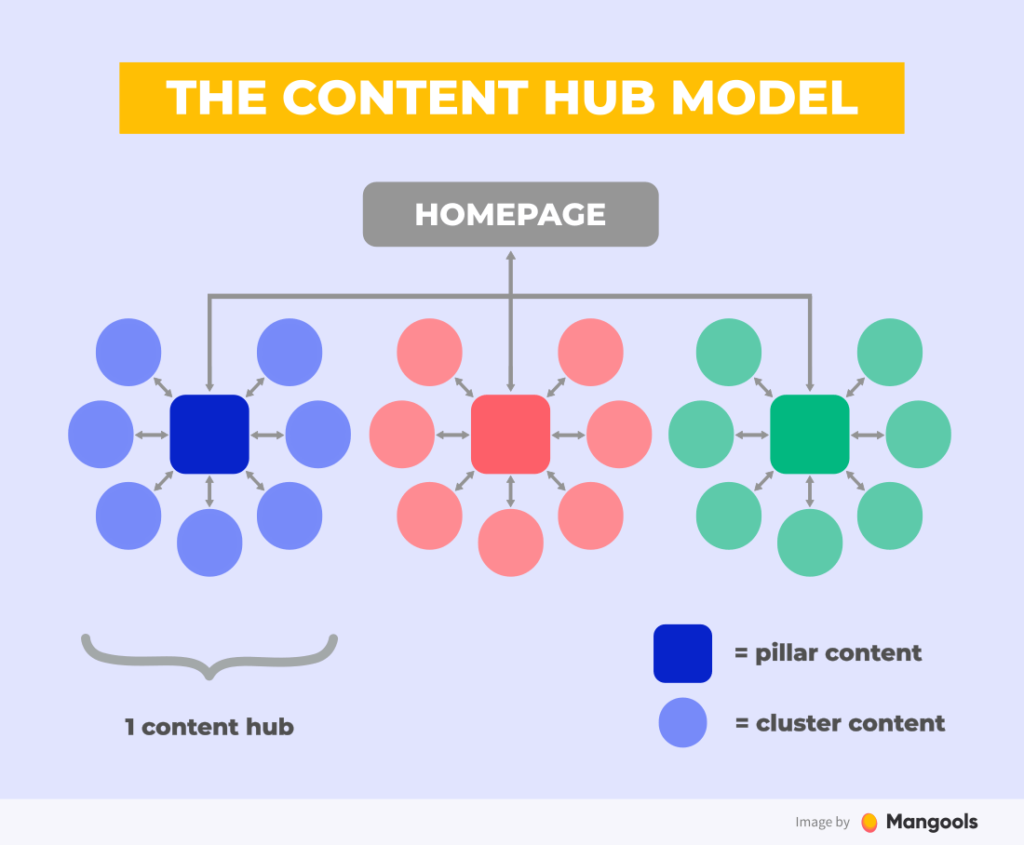Jump ahead to:
Overview
Pillar posts are ones that are well researched, well written, longer (than a snippet post) and read more like a white paper or tutorial than a snippet.
A pillar post is a substantive and informative piece of content on a specific topic.
It supports, or “holds up” a topic cluster, which is where the name “pillar post” comes from.

This post is part of a series and here is the link to the main glossary page.
Relationship to snippet posts
While Snippet Posts are generally 500 to 600 words long, pillar posts are generally much longer.
At least 1,000 words but as long as you need them to be to convey the information.
Basically, a pillar post is a large piece which can be broken down into various sections.
While snippet posts are published frequently (ideally a few times each day), pillar posts are generally published much less often.
Depending on the quality of your pillar posts and the amount of effort needed to create them, maybe once a week, maybe once a month.
Relationship to topic clusters
At it’s core, a topic cluster is a pillar post “surrounded by” a series of snippet posts, all of which link up and down and across to each other as appropriate.
Within a topic cluster, the pillar post is considered to provide the support, although personally I think we’ve got the language backwards, as in reality the internal links from the snippet posts support the authority of the pillar post.
Topic clusters are sometimes call content hubs.

Image credit: https://mangools.com/blog/content-hubs/
Various formats
There is no exact formula for creating a pillar blog post however, the following are some examples of good users of pillar posts.
What is
These posts, as the name implies, explains what something is.
The snippet posts in the topic cluster can then explain how it works, how it’s used, why it’s used, etc.
Tutorials
As the name implies, these posts teach how to do something.
The snippet posts in the topic cluster can then explain how to do related tasks.
Definitive or Ultimate Guide
These are posts that clearly define ideas and concepts and how they can be implemented.
For example, this post is a snippet for a topic cluster “glossary” of terms for SEO, Digital PR, Content Marketing, etc.
Case study
There are posts that do a deep dive in one or more specific examples of something.
Because the case studies are very specific, with a case study pillar post the snippets can then provide background to general concepts where the case study pillar posts provides the specific example.
Thesis: Present and idea or argument
Present well thought out ideas, the analysis behind them, and evidence to support them.
This can be the opposite of a case study topic cluster in that the pillar provides the general information, and individual snippet posts can illustrate specific examples.
Historical context
This is a form of a thesis pillar post, but specific to explaining how events from the past led to things being how they are today.
And like thesis pillar posts, the pillar can provide the general overview and a collect of snippets can provide specific examples to illustrate the thesis.
Glossaries
As this is a snippet that is part of a glossary, I expect this one is self explinatory.
Building topically relevant links is hard. We make it easy.
2 replies to "Pillar posts"
Hey would you mind letting me know which webhost you’re working with?
I’ve loaded your blog in 3 different browsers and I must say this
blog loads a lot faster then most. Can you suggest a good web
hosting provider at a honest price? Thanks a lot, I appreciate it!
Like many small businesses I tried inexpensive hosting at first and learned that inexpensive hosting can slow and come with substandard support. I don’t even recall the full list of hosting vendors I tried and abandoned, but it was at least 4 and maybe 5.
About two years ago I switched to CloudAccess and it’s been great.
Where GoDaddy and HostGator (and others) charged me $5 a month, I started with CloudAccess with their $10 a month plan. Then last Thanksgiving they had a Black Friday sale where their $50 a month plan become $25 a month and I switched. Then about a month ago they bundled the free version of the CloudFlare CDN with all hosting plans, so I implemented it.
I love CloudAccess. Their hosting is reliable. As you observed, the system responds quickly. Their support is top notch. I only have one complaint and it’s a small one. They way they do support is first you go online and submit a ticket, then call them and give them the ticket number. However they do not accept calls during the weekend, which means from around Fri at 8 pm to around Mon at 8 am, all support is through their portal only. Having said that, when I did once have a tricky issue on a weekend, and after a few iterations of messages through their support portal, the tech called me on my cell phone, which helped speed up resolution.
I recommend CloudAccess to everyone.